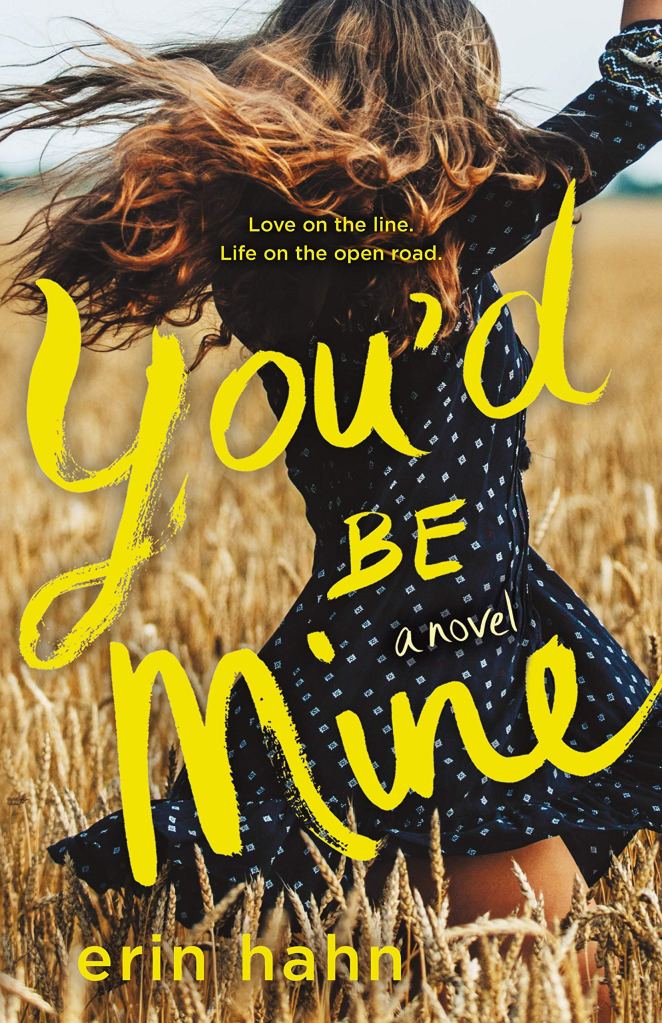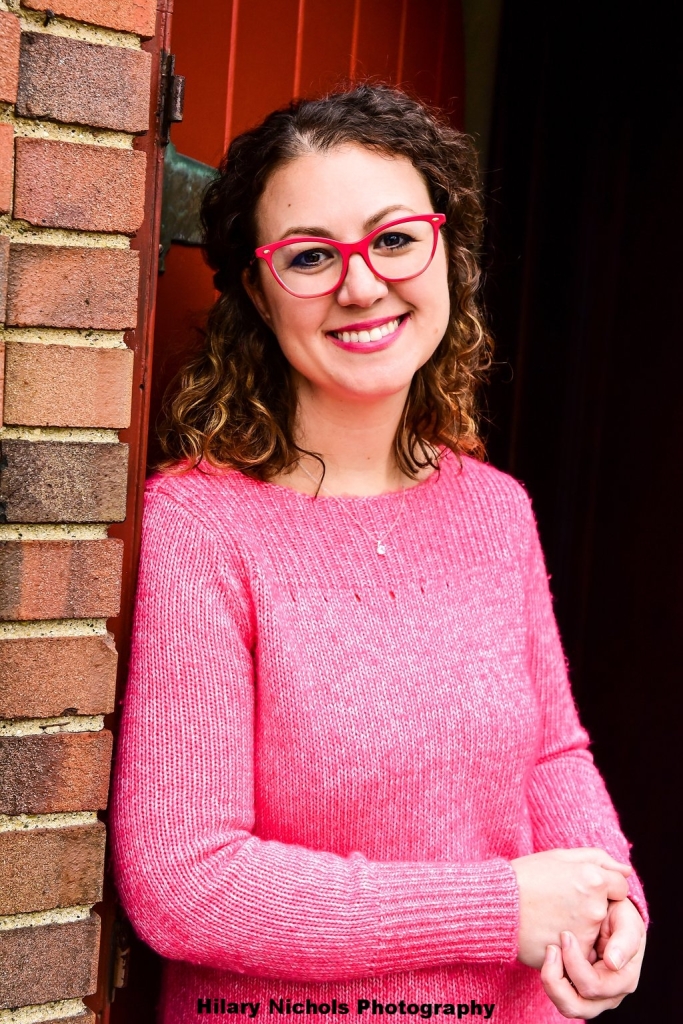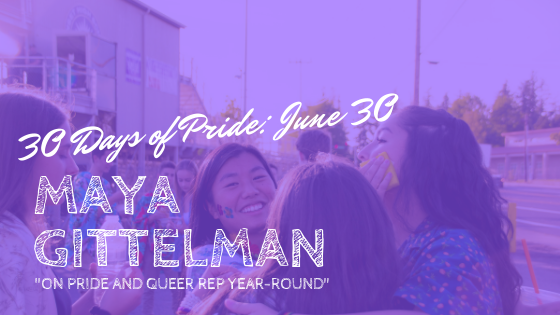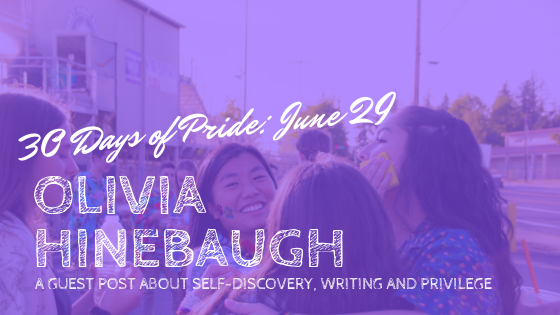I’m so excited to welcome author Erin Hahn to the blog today. I talked to Erin about her heartbreakingly beautiful debut You’d Be Mine and her highly anticipated sophomore novel More Than Maybe. You can buy You’d Be Mine on Amazon, Barnes & Noble, Book Depository and IndieBound. You can pre-order More Than Maybe, out May 12, 2020, on Amazon, Barnes & Noble, Book Depository and IndieBound. You can find Erin on her website, Twitter and Instagram. And if you love music and You’d Be Mine, check out Erin’s playlist here. Heck, listen to it while you read this interview…

Taylor Tracy: One of the goals of Shattering Stigmas is to dismantle the stigma against mental illness by creating a safe space for people to discuss and raise awareness about mental health via their favorite mental health reads and personal experiences. What does mental health awareness mean to you and how does it intersect with your creative process?
Erin Hahn: I love the term “safe space”, because I was a teen when the internet first went World Wide and changed the dynamic of sharing personal experiences. The anonymity of the internet (particularly before social media) felt like a safe space to be real. It seemed at the time that you could blog your journey and strangers could read it and there was no judgment. Except there absolutely was! And that same anonymity that the bloggers felt, protected the often cruel readers too. It was a painful realization that hurt so many young people and adults alike and scared many people back into their shame-filled shells.
Books are different. You can’t talk back to a book. You can certainly vet your feelings about something an author has written, but there is no onsite-comments section. At least for the duration of the readers time spent in the pages, they are safe to understand and read and feel whatever the author evokes in their writing. I love this. It impressed upon me that I have this small window of opportunity to reach a reader where they are at with a taste of where I’ve been and maybe show them they aren’t alone. That what they are feeling or experiencing isn’t specific to them. Or if it is, perhaps it takes the loneliness away. It can validate. Let me say that again… VALIDATE. To me, validation is everything. Social media is full of people telling others HOW TO FEEL or telling them WHAT THEY ARE FEELING IS WRONG or telling them TO STOP FEELING THAT WAY RIGHT NOW and thats bullshit (pardon). I wanted to write books, particularly for teens, that showed people saying THIS IS HOW I FEEL and THAT’S OKAY because I AM SURVIVING THE BEST WAY I KNOW HOW.
Sometimes survival is therapy, or treatment or screaming your feelings in a cemetery. Sometimes its medication or journaling or activism. Sometimes its distancing yourself from hurtful people. Its imperative that we are offering up solutions for young people and allowing them the space to see what works for them.
Taylor: Part of what I love about You’d Be Mine is that it’s a steamy romance about fame and music, but it’s also an incredibly poignant story about loss and emotionally struggling in unhealthy ways. How do you balance these two sides of the story when you’re writing?
Erin: Goodness this was a tough one for me. I’m glad you think it worked. 🙂 I was extremely mindful of the all-too common trope of “love fixing all”. More than anything, it was important to me that Clay (and to a lesser extent, Annie) healed first. Love doesn’t fix all and it’s dangerous to let young people believe it can. Everyone has their own battles to face, even in a contemporary romance. Maybe it’s not as heavy as addiction and grief and celebrity, since not everyone is as famous as Clay Coolidge, but that doesn’t mean its not real. When I set out to write a story, I’m actually writing two. I always write a dual point of view, complete with dual character arcs. Every person has a journey and just because falling in love is a apart of that, doesn’t mean its the end of it. It’s taken me a while to reconcile this process… I realize when people are picking up a YA romance, they are looking for butterflies and sweetness and sometimes my version is too messy and raw for that readership.
But that’s okay. My version of events helps me to sleep at night, knowing I’m telling it like it is. My characters will always find their happily ever after, they’ll just have to work a little harder for it.
Taylor: Some of the mental health issues you explore in You’d Be Mine include substance abuse, suicide, the pressures of fame and panic attacks. How did you choose to write about these issues in this book and what was the process of writing them like?
Erin: Wow, when you list it all out like that… *whew*. To be frank, I didn’t set out to write any of those things when I started. I don’t choose issues for my characters to face, just as real people don’t necessarily choose their struggles. I chose to write Clay and Annie’s stories and those were natural motivations and ramifications of their journey. Annie was a traumatized mess when she came to me and thats BECAUSE her parents died the way they did. Clay was a borderline alcoholic at 18, that doesn’t just happen because he liked the taste of beer. He was burying some real grief. I think it’s vital that we as authors are mindful of digging into the whys. It’s irresponsible to give a character mental health issues without exploring what brought those issues about in the first place. One of my favorite parts of that book is when Annie finished performing the song “You’d Be Mine” for the first time in the recording studio and she’s talking to her cousin, Kacey. Kacey kind of scoffs at Annie for saying she and Clay together were a volatile combination. She says, “You’re barely 18, Annie, what on earth do you know about being volatile?” Annie looks at her and says, “I was raised on volatile!” I love how Annie had the sense of self and maturity to realize her and Clay’s emotional baggage was too much even when their friends and family and managers and label execs didn’t.
Taylor: Your upcoming 2020 release More Than Maybe, also explores music, fame and teen love. Can you talk a little about what emotional and/or mental health issues you address in that book?
Erin: Sure! Luke and Vada aren’t famous in the same way Clay and Annie are. That said, Luke is the soft-spoken son of a famous former British Punk Rock icon. He has natural song-writing and singing abilities that drive his father bonkers because he’d love nothing more for Luke to follow in his footsteps and Luke would love nothing less. More Than Maybe discusses a lot of Parent-Child angst. Parents who fail to see who their kids really are and love them as is. Parents who aren’t really parents at all and break their kids hearts. Adults who aren’t biological parents, but end up filling in those parent-shaped holes in a teen’s life. These were all things that I personally related to and while they aren’t super high on the Epic Mental Health Issue roster, I think they are real. Growing up, your first interactions and experiences with mental health involve those closest to you… your families. For better or worse, they form who you become and how you deal moving forward as an adult. Luke and Vada have their work cut out for them and I think they do a wonderful job advocating for themselves as they dive into young adulthood.
Taylor: What are some of your recommendations for great mental health representation, whether it’s in books, movies, TV, etc.?
Erin: Hm. This is a hard one for me, BECAUSE mental health is so personal and I feel like me, listing out specific titles and encouraging people to go there, could lead to someone being disappointed or hurt? If that makes sense. Ironic, I know, as someone who writes the books I do. To be perfectly honest, for me, the most universal mental health representation happens in music. A well-written song can reach a person exactly where they are at and both validate and sooth at once. This past summer, something kind of horrifying and extremely painful was revealed to me, sending me spiraling, even at nearly 37 years of age. I immediately went to music and listened to the same four songs on repeat, every day, until my eyes dried up and my throat hurt from screaming. Were those songs written about me? Or the specific things that were breaking my heart? Nope. But they did a bang up job of piecing me back together regardless. Those lyrics and emotions healed me where I stood. That’s the power of music. I don’t know a book or movie or TV show that can do that so perfectly.
PS The songs were “Waiting at the End” Linkin Park, “I’ll Find You” Lecrae and Tori Kelly, “Praying” Kesha and “Life on Earth” by Snow Patrol.
Taylor: Are there any mental health issues you wish were more widely represented in middle grade and YA, or issues you hope to write about but haven’t had the chance yet?
Erin: In my third book, I’m tackling religious trauma. There isn’t a day that goes by that there isn’t some story in the news about some scandal in the church, or about how many young people are distancing themselves from religion because of abuse, neglect, persecution or gaslighting. As someone who grew up in the church and has experienced some or all of these things, I want to write about them and shed light in a pretty lonely place.
Taylor: Do you have any self-care tips, tricks or secrets you’d like to share, especially for writers?
Erin: When I am writing heavy, I have to read light. Or watch TV, light, as the case may be. People assume that because my books are on the darker side, that’s where my interest lies. It might have been at one point, but in the process of writing deep, authentic, hurting characters, I have to also put myself in that place time and again and it’s a lot! I balance that with comedy and kissing books and cross stitch and watching musicals with my little girl. I take my dog for long walks and paint my nails. I have a playlist that is entitled “Just Erin, Not a Character” where its only music that belongs only to me. After finished a particularly rough draft or scene, I bury myself in that playlist and let it heal up the sharp aches. I enjoy coloring and Great British Bake Off. I’ll make confetti cake for my family.
I’ve learned that forcing myself to be social and generous with my time is self care, as contradictory as that may sounds. I’m such an introvert and I love spending time in my head with my characters, but for my sanity, I have to close the door on them and talk to real, live people, too. It’s always a battle, but once I’m there, I’m glad I’ve done it.
Thank you so much, Erin!
It’s been a pleasure to talk to you for Shattering Stigmas!

Erin Hahn spent the first half of her life daydreaming in a small town in northern Illinois. She fell in love with words in college when she wrote for the campus paper, covering everything from drag shows to ice fishing and took way too much liberty with a history essay on the bubonic plague.
She started writing her own books when her little sister gave her shade about a country music-themed Twilight fanfic. By day, Erin gets to share her favorite stories with her elementary students. By night, she writes swoons. She married her own YA love interest whom she met on her first day of college and has two kids who are much, much cooler than she ever was at their age. She lives in Michigan, aka the greenest place on earth and has a cat, Gus, who plays fetch and a dog, June, who doesn’t.She started writing her own books when her little sister gave her shade about a country music-themed Twilight fanfic. By day, Erin gets to share her favorite stories with her elementary students. By night, she writes swoons. She married her own YA love interest whom she met on her first day of college and has two kids who are much, much cooler than she ever was at their age. She lives in Michigan, aka the greenest place on earth and has a cat, Gus, who plays fetch and a dog, June, who doesn’t.











